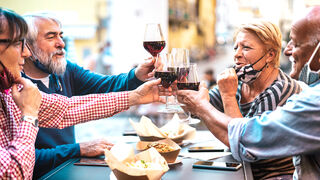Anxiety
Is the Transition to Post-Pandemic Life Making You Anxious?
Some of us aren’t ready for our pandemic lifestyle to end.
Posted May 3, 2021 Reviewed by Ekua Hagan
Key points
- Some of us aren’t ready for our pandemic lifestyle to end.
- For many, returning to normal life means spending less time with loved ones.
- After over a year of no crowds and no parties, your stamina for socializing may have diminished.
- To make your transition from pandemic to post-pandemic life easier, I suggest easing into it.

In a study recently completed in France, 15 people spent 40 days together in a cave. They had no clocks, no daylight, and no contact with the outside world. When they emerged, shielding their eyes from the sunlight, two-thirds of the study participants said they wanted to go back into the cave. I’ve been thinking about this study a lot recently when imagining what it will feel like to emerge from pandemic life.
Some of us aren’t ready for our pandemic lifestyle to end. Yes, you’ve gotten vaccinated, or you’re about to, and yes, you’re excited that you no longer have to fear that you or a loved one will get COVID-19. But all the things you had to do to protect yourself and your community, such as working from home, avoiding gatherings, and keeping your face covered, will eventually go back to the way they once were. But what if you don’t want things to go back to normal?
Benefits of pandemic life
Even for extroverts who love working in an office and get energy from being around other people, there are benefits to work-from-home life. For one thing, putting on pants not held up by elastic is optional. Zoom meetings only require a clean shirt. Turn on the “Touch up my appearance” feature, and you don’t even need to put on make-up or shower. Returning to pre-pandemic life means returning to a world of uncomfortable shoes and having to wear a bra at work. And no more hiding a bad skin day behind three layers of fabric and a filter.
For many, returning to normal life means spending less time with loved ones. You can’t take a break midday to eat lunch with your partner or play with your child when you’re at the office, miles away from home. For stay-at-home parents, there’ll no longer be a second set of hands to help you out during an afternoon tantrum. Many of us will have to return to daily commutes, too, which can suck up anywhere from 30 minutes to several hours every day.
For introverts, returning to a life of crowded bars and party invites can feel especially daunting. Being introverted doesn’t mean you don’t enjoy the company of others, but it does mean you need alone time to recharge your mental and emotional energy. After over a year of no crowds and no parties, your stamina for socializing may have diminished. At one point, maybe you could last five hours at a party, but now don’t be surprised if you’re tapped out after one. You’ll need to rebuild your tolerance for social situations.
Tips for transitioning to post-pandemic life
To make your transition from pandemic to post-pandemic life easier, I suggest easing into it. You may feel tempted to go on an activity spree as soon as you’re fully vaccinated (two weeks after your second dose of the Moderna or Pfizer vaccine or two weeks after your single dose of the Johnson & Johnson)—but don’t. All those errands and appointments you’ve put off for a year because they didn’t seem worth the risk? Don’t try to do in one week what you’d typically spread out over months. Pace yourself. Don’t forget who you were pre-pandemic. If you got exhausted after four hours of socializing pre-COVID, plan on two-hour windows post-COVID. You can work your way back up to four.
The most important thing to do if the transition to post-pandemic life is making you anxious is to be kind to yourself. If you’re ashamed of feeling this way, don’t be. Some people have a harder time adjusting to change than others. Changing from pre-pandemic to pandemic life was a huge change that many people had a hard time adjusting to, and some people straight-out refused to change at all.
If you want to keep your mask on long after others have stopped wearing theirs, do it. If someone gives you a dirty look because you’re still masked up, curse at them under your breath. They won’t notice because of your awesome mask. If you’re not eager to return to sweaty, crowded bars, but you miss hanging out with your friends, tell them you’re waiting for herd immunity and suggest a backyard BBQ instead. Then pat yourself on the back. If everyone were more like you, we probably wouldn’t be in this mess in the first place.


